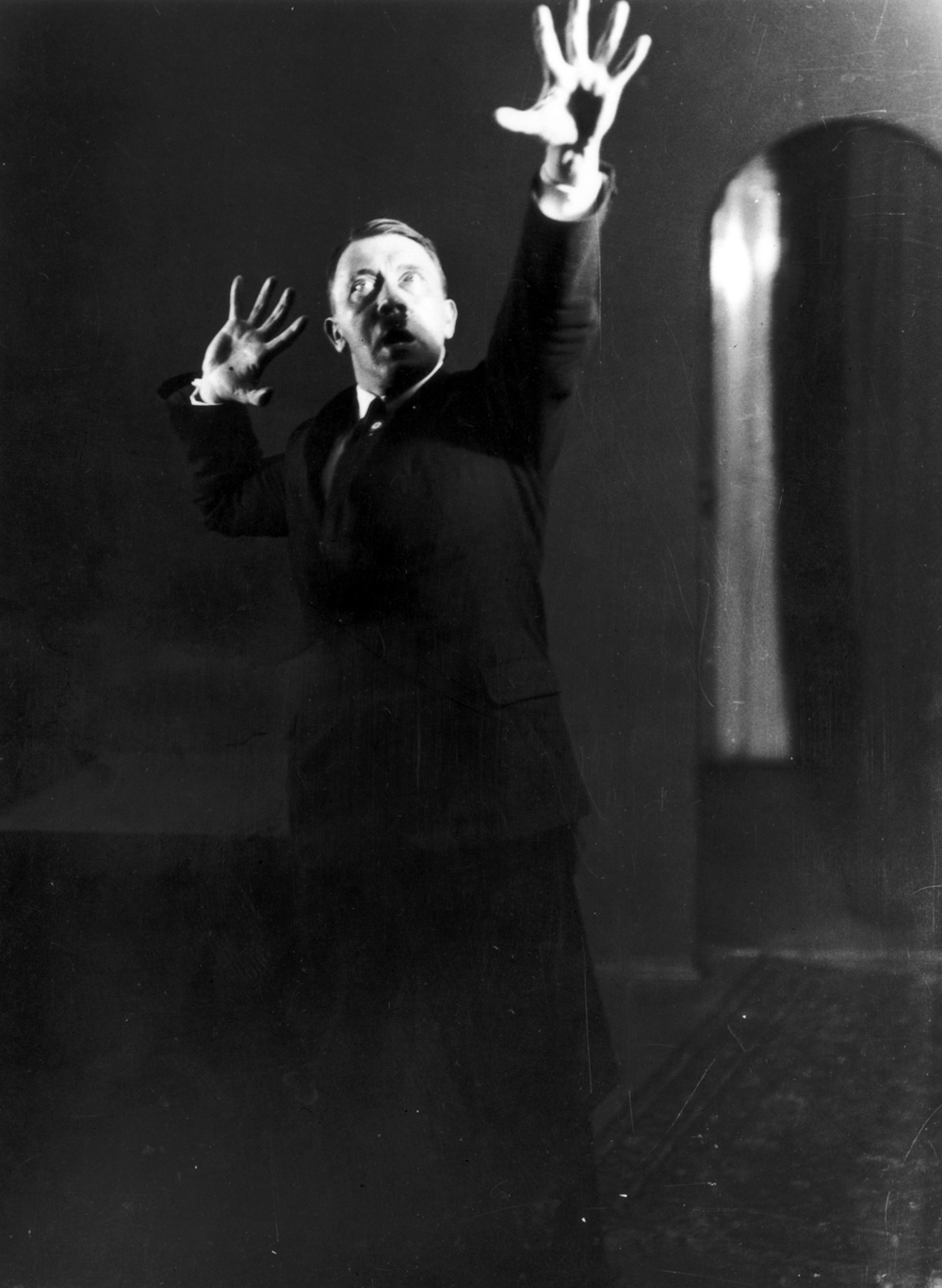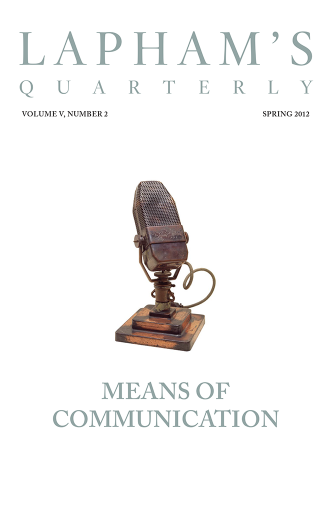I am tired and sick of war. Its glory is all moonshine. War is hell.
—William Tecumseh Sherman, 1879
The Triumph of History over Time, ceiling fresco in the Camera dei Papiri, Vatican Library, by Anton Raphael Mengs, 1772. Vatican Museum, Vatican City. Image courtesy M0tty.
He who cannot draw on three thousand years is living hand to mouth.
—Goethe
During my years as editor of Harper’s Magazine, I could rely on the post office to mark the degree to which I was living in what Goethe surely would have regarded as straitened circumstances. Every morning at ten o’clock, I sat down to a desk occupied by five newspapers and seven periodicals (four of them embroiled in politics, the others concerned with socio-economic theory or scientific discovery), three volumes of ancient or modern history (the War of 1812, the death of Christopher Marlowe, the life of Suleiman the Magnificent), a public opinion poll sifting America’s attitude toward family values and assault weapons, and at least fifteen manuscripts, solicited and unsolicited, whose authors assured me in their cover letters that they had unearthed, among other items of interest, the true reason for the Kennedy assassinations and the secret of the universe.
The afternoon mail added to the weight of evidence making the case for what I didn’t know and wasn’t likely ever to know, and, over a period of years, I came up with a risk-assessment model wired to the sound of the human voice. If, on first looking through a dispatch from the Yale University library or the White House Situation Room, I couldn’t hear the voice of its author, I let it go the way of the Carolina Parakeet. The device operated as a loophole through which I escaped the tax of having to read most of what rolled out of the presses in any given year in one or another of the dead languages designed for television broadcast or the teaching of better business management. The volume of email traffic and the expansions of the Internet over the last two decades have broadened the market for “multimedia interfacing” and “innovative delivery strategies,” brightening our horizons with “quicker access to valued customers,” accelerating the transmission of unintelligible messages written in academic cipher or ideological code. The surfeit of new and newer news, “prioritized” and “context-sensitive,” now comes so quickly to hand that, although we may wish it otherwise, we’re smothered in the feathers of the stuff—on air, in print, online; as broadcast, podcast, broadsheet, blog. Within the wind tunnels of the high-speed electronic media, the time is always now; the data blow away or shred, and what gets lost is all thought of what happened yesterday, last week, three months or twenty years ago. Unlike moths and goldfish, human beings deprived of memory tend to become disoriented and easily frightened. Not only do we lose track of our own stories (who we are, where we’ve been, where we might be going), but our elected representatives forget why sovereign nations go to war.

Adolf Hitler practices a speech, 1925. Photography by Heinrich Hoffmann. German Federal Archives, Koblenz, Germany.
On the assumption that the blessed states of amnesia cannot support either the hope of individual liberty or the practice of democratic self-government, Lapham’s Quarterly grounds its editorial premise on the risk-assessment model that allowed me to edit Harper’s Magazine. If the words on the page translate into the sound of a human voice, I don’t much care whether the author sets up the mise-en-scène in 1740s Paris or Harlem in the 1920s. Some years ago on its editorial page, the New York Times handed down the ruling that, “Great publications magnify beyond measure the voice of any single writer.” The sentence employed the wrong verb. The instruments of the media amplify a voice, serving much the same purposes as a loudspeaker in a ballpark or a prison. What magnifies a voice is the force of mind and the power of expression, which is why Shakespeare’s plays still draw a crowd in Central Park, and why we find the present in the past, the past in the present, in voices that have survived the wreck of empires and the accidents of fortune.
As a college student, I acquired the habit of reading with a pencil in my hand, and, in books that I’ve encountered more than once, I discover marginalia ten or forty years out of date, most of it amended or revised to match a change in attitude or plan. In a worn copy of Scott Fitzgerald’s The Great Gatsby, in what I take to be my handwriting at age nineteen, I find a series of exclamation points subsequently crossed out and accompanied by the remark, in my handwriting circa the age of thirty, “Too romantic.” In a biography of Aaron Burr, I come across a note, “Too cynical,” corrected at a later date and with a different pen, by the further note, “Maybe not.” Reading the work of authors reporting from the front lines of different centuries, it sometimes happens that I find myself at different periods in the history of the same map coordinates—Herodotus and T.E. Lawrence exploring the deserts of Arabia; George Orwell, Martin Amis, and Samuel Johnson tempted by the seductions of London. When I complicate the proceedings with a superimposition of marginalia reaching across a distance of fifty years and written while traveling in cities as unlike one another as Chicago and Havana, I can begin to guess at what the physicists have in mind when they talk about the continuum of space and time.
It’s been said that over the span of nine months, the human embryo ascends through a sequence congruent with fifty million years of evolution; that within the first six years of life, the human mind replicates the dream of its five-thousand-year journey from the sand castle cities of ancient Mesopotamia. The figures in the dream have left the signs of their passing in what we know as the historical record, navigational lights flashing across the gulf of time on scraps of papyrus and scratchings in stone, on ships’ logs and bronze coins, as epic poems and totem poles and painted ceilings, in confessions voluntary and coerced, in five-act plays and three-part songs.
The record is our inheritance, the one that Goethe had in mind when he suggested a restructuring of the deal that Satan offered Faust. It isn’t with magic that men make their immortality. They do so with what they’ve learned on their travels across the frontiers of five millennia, salvaging from the ruin of families and the death of cities what they find to be useful or beautiful or true. We have nothing else with which to build the future except the lumber of the past—history exploited as natural resource and applied technology, telling us that the story painted on the old walls and printed in the old books is also our own.
Cicero made the point fifty years before the birth of Christ: “Not to know what happened before one was born is always to be a child.” The American historian, Arthur Schlesinger Jr., made the same point in the essay that served as his epitaph when it was published in the New York Times on January 1, 2007, two months before he died. Under the heading, “Folly’s Antidote,” he prescribed strong doses of history as a cure for “the delusions of omnipotence and omniscience,” akin to those that persuaded the Bush Administration to stage a rerun in Iraq of America’s misadventure in Vietnam. The failure to connect the then with the now Schlesinger diagnosed as an illness which, if left untreated, he thought likely to lead to the death of the American idea. Children unfamiliar with the world in time make easy marks for the dealers in fascist politics and quack religion. The number of people in the United States at the moment who believe in the literal truth of the Book of Revelation exceeds the number of people who lived in all of medieval Christendom.
An acquaintance with history doesn’t pay the rent or predict the outcome of next year’s election, but, as the season or occasion requires, it makes possible the revolt against what G.K. Chesterton once called, “the small and arrogant oligarchy of those who merely happen to be walking about”; instills a sense of humor; and brings with it the tray of “examples and warnings” offered by the Roman historian Livy as, “fine things to take as models, base things, rotten through and through, to avoid.” About the methods of pacifying cities bloodied by civil war, I learn more from Machiavelli’s Discourses or the Memoirs of William Tecumseh Sherman than from the testimony of General David Petraeus or the commentary on Fox News. When I see Hillary Clinton and Rudy Giuliani being bundled around the country in a flutter of media consultants fitting words into their mouths, I think of the makeup artists adjusting the ribbons in Emperor Nero’s hair before sending him into an amphitheater to sing with a choir of prostitutes. The remembrance of the good old days in ancient Rome serves as a program note for the performances on set with Diane Sawyer and Tim Russert.
To bring at least some of the voices of the past up to the microphone of the present, Lapham’s Quarterly chooses a topic prominent in the news and, within the perimeter of that topic, assembles a set of relevant texts—literary narrative and philosophical commentary, diaries, speeches, letters, and proclamations, as well as essays and reviews by contemporary historians. The method assumes that all writing, whether scientific treatise, tabloid headline, or minimalist novel, is an attempt to tell a true story. Some stories are more complicated or more beautiful than others. Some stories are immortal, others incoherent. Homer told a story, and so did Albert Einstein; so do Jay Leno and Donald Duck. The stories that bear a second reading are true in the sense that the voice of the author emerges from the struggle to get at the truth of what he or she thinks, has seen, remembers, can find language to express. I know of no task more difficult, but it is the joint venture entered into by writer and reader—the writer’s labor turned to the wheel of the reader’s imagination—that produces the freedoms of mind from which a society gathers its common stores of energy and hope.
My sense of such an enterprise I gathered from a prolonged correspondence with the readers of Harper’s Magazine—people whom I never met and wouldn’t recognize if I came across them in an elevator or a police lineup. The return addresses on their envelopes didn’t amount to a demographic profile valuable to an advertising agency (some of the readers drank a great deal of brandy; others subsisted on mushrooms and dried fruit; some had attended as many as seven universities; others had yet to graduate from high school), but if I couldn’t guess at the weight of anybody’s automobile or stock portfolio, I knew that I was talking to people bound together by their interest in the meaning of words. When they found something amiss in a published manuscript, they took the trouble to correct a wrong fact or repair a disjointed paragraph. No matter what the subject under discussion—the authorship of the Bible, the moral bankruptcy of the Reagan or Clinton administrations, the trouble with New York literary critics, the neglected reasons for the fall of the Ming Dynasty—the care taken with the composition of their letters testified to the importance they attached to the telling of a truer story. Like the writers whose work appeared in the magazine, its readers were unafraid of the first-person singular, willing to think out loud, to bet the pot on a metaphor, to look for words that maybe could settle the wilderness of their experience with the fence posts of a beginning, a middle, and an end.
Addressed to readers similarly inclined, Lapham’s Quarterly doesn’t aspire to the status of homework. It undertakes to foster and extend an acquaintance with history, to suggest that the uses of the past are as rich in possibility as were the American forests before the arrival of Christopher Columbus. Again, I’m indebted to Arthur Schlesinger, whose enthusiasms were communicable. Knowing that the four most expensive words in the English language are “This time it’s different,” Arthur also knew that the study of history is a perpetual work in progress carried forward under the headings of the provisional, destined never to reach a final verdict or discover the lost gold mines of the imperishable truth. Some things change, others don’t, but absent a knowledge of which is which, how then do we find our bearings in the drift of time?
So also is Lapham’s Quarterly a work in progress, provisional and incomplete, its elements forthcoming from a quorum of contributing historians and at the suggestion of readers who send texts and commentaries to www.laphamsquarterly.org; its subscribers can expect the eventual additions of Letters to the Editor, Notes on New Books, Counterfactual Speculations, and Recommended Reading. Because the contents will never qualify for the label “comprehensive,” the editorial choices come down to the difference between writing that’s a pleasure to read and writing that isn’t. Neither the holder of an advanced academic degree nor a candidate for university tenure, I can afford to take liberties with the rules of scholarly category and definition, and from an author whom I admire I will listen to anything and everything—to reports of marvels in Samarkand or Winesburg, Ohio, to descriptions of Talleyrand’s mistresses or Kaiser Wilhelm’s uniforms, to suspicions of fraud in Albany, or to a rumor of giant ants standing watch over the treasure of Peru. If I’m to believe the physicists and the evolutionary record, the figures in the dream inhabit the continuum of space and time, which means that they depend for their existence on acts of the imagination.
Heraclitus named war “the father of all things,” and so it is with the first issue of Lapham’s Quarterly. The decision wasn’t hard to reach. The history of Western Civilization bills itself as the romance of war. On whom else do we bestow the prize of immortality (Caesar, Genghis Khan, Napoleon, Adolf Hitler) if not on the champions of mortal destruction? For generations it’s been said that man’s destiny is war, the trials by combat endorsed by the philosopher Georg Wilhelm Friedrich Hegel, as the “terrible,” but “necessary” purgative that “saves the state from social petrification and stagnation,” praised by the poet William Ernest Henley as the “giver of kingship, the fame-smith, the song-master.”
An old story, told and retold, in different languages, under different flags, with the blessing of different holy names, across the span of a hundred generations, the lines of bloodstained succession as fiercely preserved as a family inheritance. Pick up the thread of the narrative in Babylon in the days of Cyrus the Great, move forward in time to the triumphs of Alexander of Macedon, student of Aristotle, to Caesar’s legions governing what they knew as the province of Mesopotamia, through the centuries of languid despotism imposed on the valley of the Euphrates by the grand viziers of the Sublime Porte, to the division of the Ottoman spoils at the Treaty of Versailles, and so at last, with a new store of fireworks and a fresh set of headlines, to President George W. Bush’s theory of democratic empire at play in the wreckage of downtown Baghdad.
No matter how often told, the story begins with a call to arms and ends with a cortege of postmortems. The sequence of texts in this issue of the Quarterly follows the customary procedure, the rules of engagement subject to change on short notice, the fields of honor seldom as advertised. Had it occurred to President Bush and his adjutants to conduct a similar review—of their thinking about war as well as about the disposition of their horses and guns—it’s at least conceivable that the U.S. Army might not have been sent to trample out the vintage where Saddam Hussein supposedly had stored the grapes of wrath. The industrial-strength bloodletting on the Western Front in World War I discredited the notion of war as a glorious undertaking certain to provide proofs of selfless valor and noble character; the dropping of the atomic bombs on Japan in August 1945 mothballed the use of large-scale warfare as the heavyweight instrument of foreign policy. If it’s true that all societies trace their origins to the god of war, it’s also true that over time they learn to limit the collateral damage, to no longer regard war as a law of nature but as a form of cultural expression, like the wearing of togas and Halloween masks.

Bust of a Warrior, by Leonardo da Vinci, c. 1475. The British Museum, London.
The military historian John Keegan observes in A History of Warfare that sooner or later the captains and the kings find more cost-effective ways of keeping the peace and robbing the populace. “War, it seems to me, after a lifetime of reading about the subject, mingling with men of war, visiting the sites of war and observing its effects, may well be ceasing to commend itself to human beings as a desirable or productive, let alone rational, means of reconciling their discontents.” Not as tentative as Keegan, the historian
John Mueller shapes the argument of his book The Remnants of War on the premise that “unlike breathing, eating, or sex, war is not something that is somehow required by the human condition or by the forces of history. Accordingly, war can shrivel up and disappear, and it seems to be in the process of doing so.”
Consistent with the story lines of the twentieth century’s wars to end all wars, the conclusions drawn by Keegan and by Mueller suggest that President Bush’s splendid little war in Iraq is the work of a man imprisoned in an obsolete tense. His adjutants apparently find it hard to say anything in his presence that doesn’t go well with the sound of bugles, and in the speeches staged against a backdrop of flags and high-ranking uniforms, he presents himself as a military commander in the romantic tradition of General George Patton, captivated by the song of the sword that Oliver Wendell Holmes brought to the students at Harvard University in 1895, content with the blessing of Saint Augustine. To accept as a consequence the price being paid to the piper in Iraq is to acknowledge the truth of the old Arab proverb that says we have less reason to fear what might happen tomorrow than to beware of what happened yesterday. I know of no better reason to read history. Construed as a means instead of an end, history is the weapon with which we defend the future against the past.


